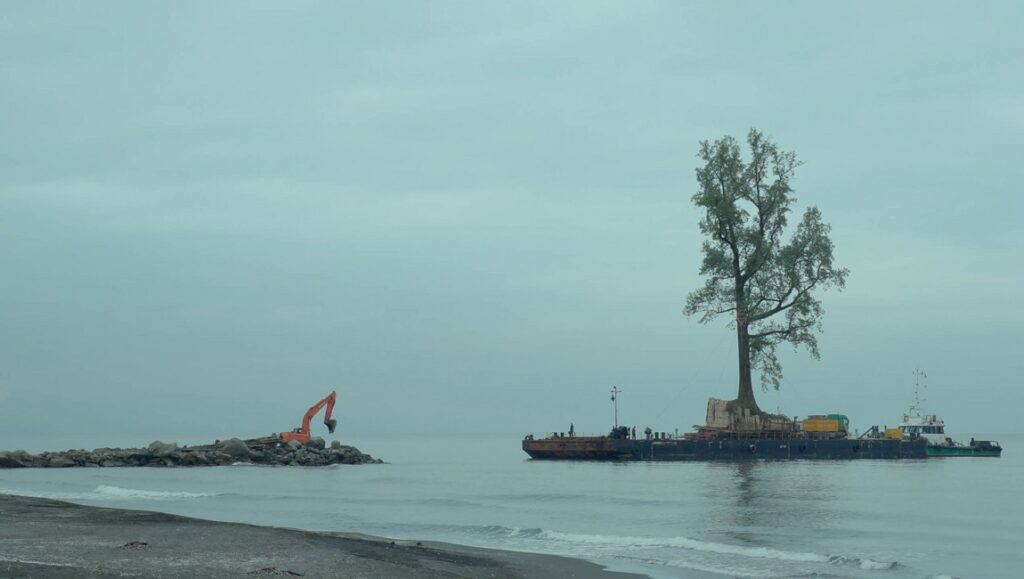Taming the Garden is a beautiful and brutal work, Jashi both in awe of the work her camera captures and aware of its destructive nature.
Salomé Jashi’s new documentary Taming the Garden begins with a striking image: as two men fish off of a rocky coastline, a giant tree cuts through the distant horizon, slowly creeping across the calm sea while standing fully upright on a barge. It’s both majestic and surreal, or, in Jashi’s own words, “It was beautiful, like real-life poetry, but at same time, it seemed to be a mistake.” File under “stranger than fiction,” as the film proceeds to detail the process of uprooting these stories-tall behemoths and transporting them to an entirely man-made personal forest of an unnamed billionaire. And it is a laborious, fascinating process, as Jashi locks her camera down in static master shots and observes men at work in all stages of this bizarre, Herculean endeavor. There are dirt roads and paths carved into the landscape, where the area around each tree’s roots has been excavated and then carefully wrapped in tarp and buttressed with lumber. There’s an elaborate system of metal pipes and tubing that are pounded horizontally through the ground which allow these massive objects to roll, before being lifted via crane onto the backs of flatbed trucks. These, in turn, creep slowly from forests to main roads and then finally the shoreline, to be loaded onto barges. Individual scenes are held for what seems like an eternity, typically observing one discrete action as it is performed from beginning to end. There are no title cards with information or talking-head interviews here; what contextualizing details there are can be gleaned in passing from conversations or must be entirely inferred from the images themselves.
Shot intermittently over the course of two years, Taming the Garden is not a typical issues documentary, but Jashi does have a point of view. Like the films of Nikolaus Geyrhalter, particularly Our Daily Bread and the more recent Earth, Jashi is simultaneously in awe of the insane endeavor unfolding in front of her camera but also well aware of the damage such processes inflict on both nature and the surrounding communities. It’s impossible to witness the deep gashes left on the landscape by huge pieces of equipment and be unmoved. She also gives screen time to various residents of the towns and villages where she’s shooting; some welcome the infrastructure that the project is bringing to their area, while others only care about the money they’re being paid to put up with the inconvenience. Still others worry about broken promises or the buyer backing out of due payments, while some are simply distraught that these natural wonders, some centuries old, are being removed at all. There’s also the matter of the anonymous person at the center of all this, who is unnamed in both the film and press materials. Several people in the film reference Bidzina Ivanishvili, the billionaire former Prime Minister of Georgia, although it’s unclear if this is known fact or merely idle conjecture. Jashi ultimately reveals the tree’s final resting place in the last few minutes of the film. A far cry from the controlled chaos of their uprooting, this artificial forest is calm, perfectly manicured, and maintained by an army of workers. It’s a startling contrast, although also beautiful in its own right. Left largely implied in-film, but lingering in impression long after, is the notion of a fabulously wealthy elite literally reconstructing the world according to their personal taste while the rest of us deal with the scars of their whims.
Originally published as part of Sundance Film Festival 2021 — Dispatch 3.


Comments are closed.